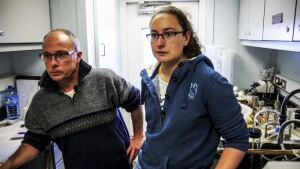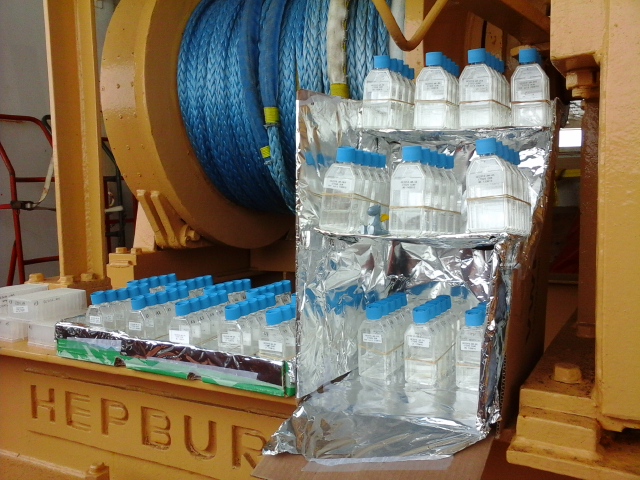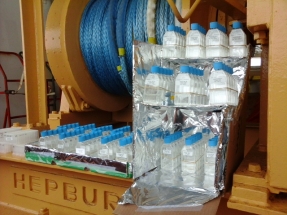During the Green Edge cruise aboard the Canadian ice-breaker, much of our work is to keep phytoplankton alive out of their natural environment. We also aim to isolate them to get clonal cultures.
Roscoff team and new microalgae species
Roscoff biological station (France, Brittany) hosts a culture collection (RCC, http://roscoff-culture-collection.org) since the 90’s. It’s one of the biggest microalgae collection around the world. Roscoff Scientist are partly invested in the search for new phytoplankton species to reference them in their collection. Such work may allow us to highlight potential new species or may provide us new model organisms to investigate polar microorganism’s way of life.
Three methods are used to prepare culture samples aboard:
- The first is to add nutrients in filtered seawater.
- The second is based on the cells concentration in 2 liters of seawater by using tangential filtration with small volumes (20 to 30 mL).
- In the last approach, seawater is diluted into 96-deep-well plates in order to get 1 or 10 cells per well.
To preserve the natural conditions of our cultured cells, we try to keep them in cool and appropriate lighting conditions to their development. For this, we possess on board a refrigerator that allows us to comply with these conditions. If the temperature of the culture chamber can stay stable at 4°C, maybe some phytoplankton cells will stay alive until we come back to Roscoff. We look forward seeing which one are growing even if not everything has gone to plan …
Technology played a trick on us
The first half leg reaches its end and our incubator begins to show us signs of weakness: the thermometer showed 10°C instead of 4°C… Determined to solve this problem, we tried to defrost several times the device to get things back to normal. This morning, neither sound nor images: the incubator had definitely given up the ghost.
In this situation, our handsome little cells were left in sweltering temperatures for their metabolism which only supports very low temperatures. Even if for us, the boat temperature was quite pleasant, for them, 23 ° C is too high so that they can continue to develop normally. That’s why, we had to use ingenuity to solve problems: on the deck of the boat, the temperature is ideal for our cell cultures!
8:30 am: manufacturing workshop for a new incubator made of cardboard, aluminum foil and adhesive tape. Fortunately, the failure would only be caused by a fuse problem and now, all’s right in the world again!
Hope that our cell cultures have not suffered too much and that we will celebrate our 100th cell culture today!





One thought on “Home made growth chambers on the deck of the boat”